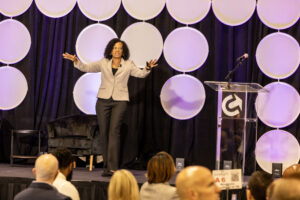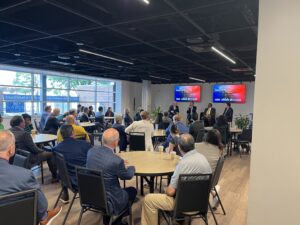On a recent morning, Abhi Sastri, holding a Mean Mug latte in one hand and his iPhone in the other, makes a bold prediction as he looks across the North Shore landscape.
In the next five to 10 years, Chattanooga will be known for an emerging industry.
“Data centers,” he said.
Data centers are the behemoth storehouses that fuel the world’s search engines. Every Google search? Every ChatGPT request, streamed movie and hosted website? It’s only possible through data centers.
The closest one that hosts ChatGPT?
“Probably Virginia or Atlanta,” he said.
Sastri, though, predicts that data centers will localize in Chattanooga; smaller versions will exist in office buildings, supplying Internet search power for regional residents, for example. Investors will be able to capitalize on building and leasing data centers just like “multi-family rentals,” he said.
This is why he loves Chattanooga.
“Chattanooga has the lowest utility rates and the fastest Internet,” he said. “And the brain dump of TVA, EPB and Oak Ridge.”
One big problem needs to be solved.
Energy use.
20 CHATGPT QUESTIONS = ONE BOTTLE OF FRESHWATER
Data centers already consume 2% of US electricity use, the Dept. of Energy states, as they consume “10 to 50 times” the energy compared to an office building of similar size.
Currently, data centers produce 2% of all worldwide carbon emissions and are expected to surpass the airline industry this year, Sastri noted, adding that by 2040, data centers are expected to consume 20% of the world’s power generation.
“For every 20 to 50 questions you ask AI chatbots like GPT, data centers can consume almost a water-bottle amount of freshwater in their evaporative cooling systems,” Sastri said.
Sastri is the founder and CEO of FLUIX, a revolutionary startup that promises to reduce energy use and cost in transformative and timely ways.
FLUIX uses multi-modal, fully autonomous AI technology to optimize “fragmented facility systems” – HVAC, IT, water and lighting – inside critical data center buildings.
The savings are astronomical.
“40% in energy costs, 35% in carbon emissions and millions of gallons of daily water usage,” Sastri stated. Inside a California server room, FLUIX’s Eco-AI cut AC energy use by 90%, FLUIX reports.
“FLUIX is poised to save 3 gigatons of CO2 emissions per year at scale by 2050,” Sastri said.
Currently based in San Francisco, FLUIX is now part of Chattanooga’s entrepreneurial story.
In January, FLUIX was named one of five global startups participating in the 2024 CO.LAB and gener8tor Sustainable Mobility Accelerator.
These startups – chosen from 145 applicants over 25 countries – each receive a $20,000 initial investment and 12 weeks of access to “Chattanooga’s premier technology, research and government leaders,” according to CO.LAB, with the chance of a post-program $100,000 investment.
“This cohort is not only the first of its kind in Chattanooga, but in the country as well,” said CO.LAB CEO Tasia Malakasis. “Bringing in such a wide range of mobility startups, all that play to the strengths of Chattanooga, position this city to be a leading network for sustainable transportation, data, energy and movement.”
CHATTANOOGA: THE NEXT DATA CENTER HUB?
As data centers consume more energy – “10 to 50 times the energy per floor space of a typical commercial office building,” the Department of Energy states – FLUIX’s work will only increase.
“The everyday world is run by the transmission of data,” Sastri continued. “Whenever a person sends an email, makes a call, streams video or uses ChatGPT, data centers are the infrastructure that hosts that activity.”
Traditionally, we think of infrastructure as roads, utilities and buildings. Sastri wants to add data centers to the ways we imagine regional infrastructure. Walk by a downtown office building and somewhere inside?
“One floor will be a data center,” he said.
The US Dept. of Energy defines a “small” data center as “localized data centers under 5,000 square feet of computer floor.” Its Center of Expertise for Energy Efficiency in Data Centers reports that small data centers house “more than half” of all US servers yet often lack the resources to achieve the energy savings of larger data centers. “This all adds up to a huge opportunity for reducing energy demand in data centers across the nation,” the Center reports.
More than 30% of the world’s data centers are housed in the US, writes Shannon Osaka in The Washington Post, which also cites a Virginia Tech study that claims data centers are among the top 10 most water-intensive commercial industries in the nation. With many data centers located in western states, where water is often dangerously depleted, a growing conflict is emerging.
“A large data center, researchers say, can gobble up anywhere between 1 million and 5 million gallons of water a day — as much as a town of 10,000 to 50,000 people,” Osaka writes.
While some tech companies are developing and launching waterless cooling systems, Sastri is tackling data center energy use by using technology to reduce energy use. Again, this is why he loves Chattanooga.
“With EPB’s fiber network and TVA reliable and low power rates, I am very bullish that the area will become the next data center hub, filling in the data demand gap that currently exists between two other hubs: Dallas, Texas, and Ashburn, Virginia.”
THANK YOU, CO.LAB AND CHATTANOOGA
While attending the University of Central Florida with a degree in aerospace engineering, Sastri had already launched his first business – building and selling high-performance computers – before founding FLUIX in 2019.
Today, he’s thankful to be part of Chattanooga’s entrepreneurial community and predicts significant changes on the horizon.








